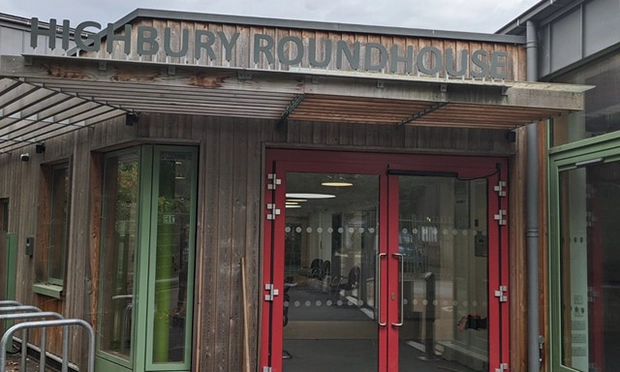Keeping all community centres open ‘very challenging’, council warns

Highbury Roundhouse is one of 48 council-owned assets that will be reviewed. Image: Julia Gregory
Islington Council’s ongoing review into its community centres across the borough could see some close their doors, the executive has warned.
The Town Hall’s inquiry into the state of the 48 assets has been prompted by many factors, including ad-hoc management, dilapidated buildings, and the need to understand the ‘efficiency’ of spaces when compared to local demand.
A report put to the Homes and Communities scrutiny committee on 14 October made it clear the assessment could result in closures.
“In light of the financial constraints, [the committee] would need to be realistic as keeping all the community centres would be very challenging,” it stated.
Cllr Sheila Chapman, the Town Hall’s equalities, communities and inclusion chief, previously stressed that the council was “strapped for cash”, and urged members to be “imaginative” during the inquiry.
At the committee meeting last week, more light was shed on the need to ensure the community hubs were governed properly.
Cllr Chapman spoke specifically of the need to change “informal management arrangements”, where individuals are in charge of spaces owned but not directly managed by the council.
“I’m not pulling punches — you will all know there are community centres which are difficult to book, difficult to get hold of people, and there’s no real name to put to the management arrangements because they are ad-hoc and informal.”
In some cases, she said, the council was not entirely sure who holds the keys to the buildings, or even how much they are charging residents to use them.
“They may be taking cash and the heating’s on all day,” she said.
Cllr Chapman assured the committee it would receive a breakdown of utility costs for each centre in a report further down the line.
Despite management issues and the need for more clarity over booking and paying for spaces, the executive member said a one-size-fits-all structure for governance was not the solution.
“We recognise it’s a broad church, and we’ve got far too many structures right now but we certainly won’t be imposing one ‘right way’ to run the community centres.”
This reflects the council’s eagerness to look at its community assets ‘strategically’, rather than on a case-by-case basis.
“If there’s a particular group that meets weekly at a community centre, there may be a more suitable space 200 yards away they can utilise more cheaply, efficiently and easily.
“This requires a more strategic look at the locality,” Cllr Chapman said.
The council only directly manages three of the centres it owns: Andover, Vibast and Jean Stokes.
Fourteen other hubs are run as part of the community-led Octopus network.
Lorna Hughes, review lead and assistant director of community wellbeing and engagement, said “well-functioning centres” in boroughs like Newham showed best practice for managing these community assets, but it was too early to make direct comparisons to Islington.
The issue of dilapidation was raised by co-optee member Dean Donaghey, who probed the executive on why local authority-owned assets were in such conditions in the first place.
“[You have] got a massive team of plumbers and painters who work for the council. They should be met to the same high standard as council houses.”
Hughes said that fixing deteriorating infrastructure like boilers, central heating systems, and equipment are “costly to repair”.
“Some of these needs real, huge investment to bring them up to a modern standard that also has an impact on our carbon reduction.
“We’re talking about costly dilapidation, not just a lick of paint or screw required,” she said.
The report also suggested the review had been delayed because of the Covid pandemic and “personnel changes”.
The executive has arranged three evening workshops during the review, where Hughes and Chapman will join members from each ward to best understand local need.
A study from Foundation for Future London in June showed that in some of the capital’s boroughs, closures now outpace openings.
But the report praised Islington’s ample 223 centres, suggesting the borough has “a higher focus on nurturing their community offerings”.
Brent Council had the highest rate of closures, with 13 council-run community spaces shut down between 2018 and 2023.
In that same period, 46 community spaces across London were permanently closed, the report said, as revealed by a Freedom of Information (FOI) request.
